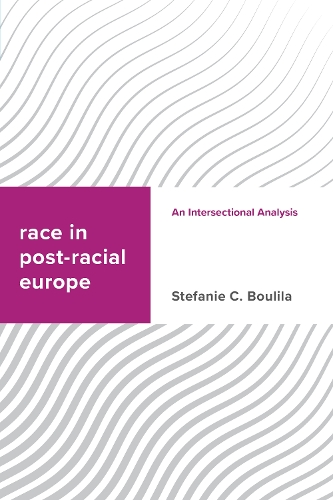
Race in Post-racial Europe: An Intersectional Analysis
(Hardback)
Available Formats
Publishing Details
Race in Post-racial Europe: An Intersectional Analysis
By (Author) Stefanie C. Boulila
Bloomsbury Publishing PLC
Rowman & Littlefield International
7th August 2019
United Kingdom
Classifications
Professional and Scholarly
Non Fiction
Central / national / federal government policies
Society and culture: general
Social and cultural anthropology
Migration, immigration and emigration
Ethnic studies / Ethnicity
Social and cultural history
LGBTQIA+ Studies / topics
Ethnic groups and multicultural studies
305.80094
Physical Properties
Hardback
190
Width 161mm, Height 228mm, Spine 21mm
454g
Description
Europe is witnessing a new era of racial denial. After decades of anti-racialism, post-feminism and the recognition of some queer lives, the language of equality and diversity suggests that Europe has not only overcome racism but also sexism and homophobia. Racist violence in the wake of the 'refugee crisis', Brexit as well as the force of the extreme Right have been blamed on 'too much diversity' and 'false tolerance' by European leaders and commentators alike. The reiteration that racialized Others are a danger to European liberal gains has become a 'common-sense' claim in the call for the securitization of the European borders and 'tougher rules' for immigrants and served as the basis for the call to end multiculturalism Race in Post-racial Europe offers an analysis of the intersectional logics of post-racial formations in Europe. With the increasing significance of gender and sexual norms in debates around migration, post-racial formations have yet to be studied in conjunction with the liberal articulation of Europe as post-feminist and post-homophobic. Whether in the campaign for the minaret ban in Switzerland, in Dutch gay rights discourses or in the aftermath of the Cologne events, the New Right has successfully joined forced with some feminist and LGBT voices in the claim that women and queers need to be protected from migrants. In Europe, where race is deeply intertwined with notions of modernity, gender and sexuality have proven particularly relevant sites of racialisation.
Reviews
From astute observations of Meghan Markle and the multicultural monarchy, to the spectre of `monstrous Muslim women, Boulila brilliantly captures the political zeitgeist of the post-race moment with a rigorous and witty analysis that slices into the racism, sexism and Islamophobia that fuels the seductive common-sense political popularism sweeping Europe. A powerful and eloquent read that lifts the fog so we can see the truth! -- Heidi Safia Mirza, Professor of Race, Faith and Culture, Goldsmiths, University of London; Co-editor of Dismantling Race in Higher Education: Racism, Whiteness and Decolonising the Academy (Palgrave McMillian)
In this book Stefanie C. Boulila makes a persuasive and compelling argument: we need the analytical category of race to explain the post-racial imaginary. Informed by a sustained engagement with Black feminist and feminist of colour thought, this book shows us the value of intersectionality and other terms that are often dismissed because they are dangerous. Boulila's new book will become a key text in what she calls "a growing archive of unruly knowledge." -- Sara Ahmed, feminist writer and independent scholar
Author Bio
Stefanie C. Boulila is a Postdoctoral Researcher in the Gender Studies Programme, University of Gttingen
